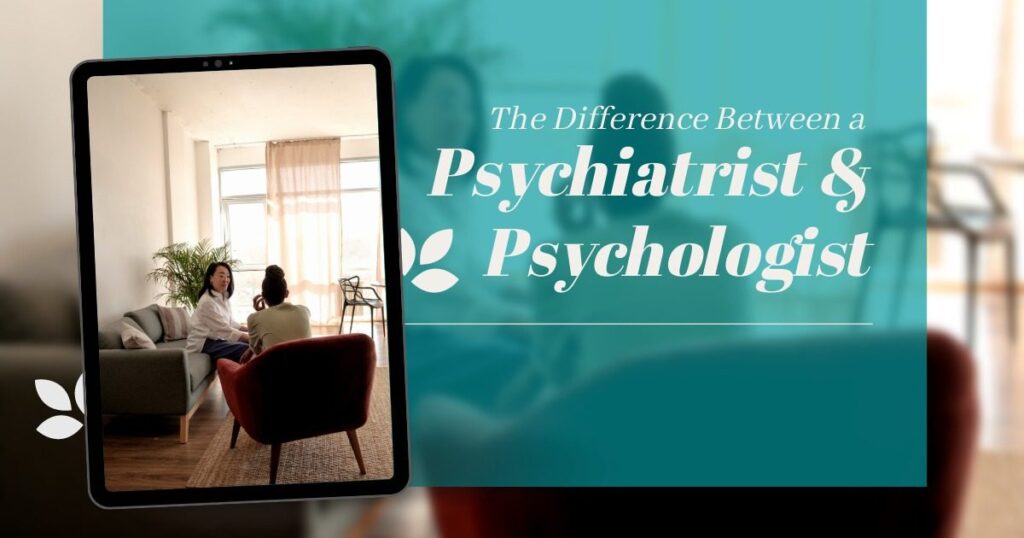The distinction between a psychiatrist & psychologist is a popular topic in the mental health space. A Psychiatrist & psychologist are two related fields of study and practice, but psychiatry relies on the administration of medicines, whereas psychology favors talk therapy. They face many of the same mental health challenges and problems.
Who is a Psychiatrist?
Psychiatrists are medical practitioners who focus on diagnosing and treating mental health issues, particularly those serious enough to necessitate inpatient care. To understand mental health issues, psychiatrists look at them from a medical perspective, focusing on biological causes and treatments. A psychiatric visit may include a physical examination and blood tests.
Who is a Psychologist?
Psychologists are experts in studying the mind, emotions, and actions. Diagnose and treat persons with mental problems mostly through counseling and behavioral training. They offer diagnostic tests for numerous illnesses, including ADHD. Psychologists can help with many issues, including depression, anxiety, and problems paying attention or learning.
Differences Between Psychiatrist & Psychologist
Some of the differences between them. Psychiatrists are doctors and can prescribe medication. Psychologists are not restricted to treating mental diseases, even though this is their specialty area.
These are some of the most important distinctions that can be made between the two:
When treating mental illness, psychiatry relies on medication, while psychology relies on Mental Health counseling.
They approach treating mental illnesses very differently, which is a major point of division between them.
When treating a patient, a Psychiatrist usually starts with medicine. A care plan for teen patients is built when the diagnosis is made, focusing on treating symptoms using medication and psychotherapy. Even though they may be skilled in psychotherapies like cognitive-behavioral therapy, psychoanalysis, and others, in a conventional mental health care context, Psychologists are typically responsible for administering therapies.
Psychiatrists use a variety of therapies to treat their patients’ symptoms and assist them in coping with their challenges. CBT, Gestalt therapy, psychodynamic therapy, REBT, and Humanistic therapy are just a few of the many types of therapy they may utilize. Psychometric tests that analyze the mental condition of an individual and personal characteristics to identify the best approach for a patient are also within their scope of expertise.
If someone is sad and just attempted suicide, a psychiatrist would initially administer antidepressants to calm their suicidal thoughts and encourage them to open up about their feelings. Therapy will begin immediately once the patient has been stabilized, in an effort to find the root cause of their issues and provide tools to assist them to overcome their negative thoughts.
Psychiatrist & psychologist work together to better serve their patient’s mental health needs.
Psychiatrists Have the Authority to Prescribe Medication, While Psychologists Don’t.
Medicine-trained psychiatrists can legally administer medicines to their patients. Medications are the primary treatment for many diseases, including schizophrenia, Obsessive Compulsive Disorder, Bipolar Disorder, Attention Deficit Hyperactivity Disorder, and more.
However, they can’t be prescribed by psychologists. Patients are diagnosed and treated after undergoing a series of psychological exams. Psychologists send patients who need medical treatment to Psychiatrists when the situation warrants it.
A Medical Degree is Necessary to Practice Psychiatry, While Psychology Needs a Bachelor’s and a Master’s University Certificate in Psychology.
Psychiatrists are medical professionals who specialize in psychiatry. Accredited medical schools require that those interested in becoming psychiatrists first complete the MBBS program, after which they must complete the M.D. in Psychiatry degree program. As a result, children are required to finish 7 and a half years of school (5 and a half years of MBBS and 2 years of Master’s Degree).
A job as a Psychologist necessitates both a bachelor’s and master’s degree in psychology. In order to become a Clinical Psychologist, you must complete a second two-year degree program in Clinical Psychology. To earn a B.A., M.A., or M.Phil, you’ll need to put in 5 to 7 years of study time.
Psychiatrists Treat Severe Mental Illnesses, Whereas Psychologists Deal With Problems Related to Behavior and Growth.
Diagnosing and treating a wide range of mental and physiological disorders, such as schizophrenia, chronic depression, bipolar disorder, psychotic behavior, and autism, is the specialty of a psychiatrist.
Psychologists, for example, are likely to examine people who have mental health issues such as anxiety, mild depression, and trouble adjusting to new environments.
Length of Appointment with Both Professionals Differ.
Because psychiatrists are trained medical practitioners, they can prescribe medication and spend a large portion of their time with patients discussing medication management.
Psychologists devote a great deal of their time and energy to psychotherapy and the behavioral treatment of patients’ emotional and mental distress. Expertise in psychological testing is crucial in analyzing a patient’s mental condition and choosing the most appropriate treatment plan for them.
Mental Health Services for Teens in Southern California
Both psychiatrists and psychologists are qualified to diagnose and treat mental illness patients. When two different therapists work together on a patient’s mental health, they can obtain results superior to what either therapist might do working alone.
At Hillside Horizon for Teens, we believe that a multi-step procedure is necessary to achieve the best possible results. Get to know some of the most accomplished psychiatrist & psychologist in Southern California who collaborate to deliver the most effective treatment possible for adolescents living in the region. To learn more, call us at 855-746-8378.




